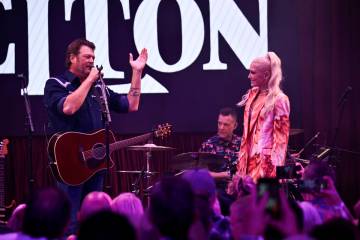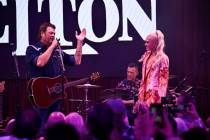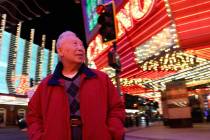Fast-paced sketches, multiple characters, two actors tossed into ‘Greater Tuna’
"Come out and audition for 'My Fair Lady.' (Director) Joe-Bob says he wants to integrate the cast this year, so if you know any Negro or Mexican-American actors or actresses, have 'em come and try out for the chorus."
-- "Greater Tuna"
Straight from station OKKK -- yes, the last three call letters suggest the "hood" you're entering -- comes the play about the radio show about the rubes and redneck 'tudes of Tuna, Texas.
"We have one character, Elmer, who's a card-carrying KKK member, he's normally done in the blazing orange hunter's outfit and ball cap, but we have him in a Klan outfit," says Sean Critchfield, director of "Greater Tuna," opening Las Vegas Little Theatre's 2010-11 season.
"At the end, he leads a group prayer. If that doesn't hold up the absurdity of the thinking in front of you, nothing will."
Breakneck sketches and quicksilver costume changes challenge two actors, splitting the portrayals of 20 uber-hicks from the sticks -- all ages and both genders -- in an outpost described as Texas' third-tiniest town. (What do you call Tuna residents? Tuna fish?)
"We're going for a 'Carol Burnett Show' feel," Critchfield says. "I even told them to watch the famous elephant story from the Burnett show," in which Tim Conway, in an riotous off-script riff about a circus pachyderm and his dwarf trainer, famously broke up his castmates in a "Mama's Family" sketch.
"I told them, 'At no time do I want you to lose your sense of play.' They can go off on tangents, and it's a beautiful thing to watch."
Satirizing Southern stereotypes -- courtesy of Dixie writers Jaston Williams, Joe Sears and Ed Howard -- "Greater Tuna" delivers a kaleidoscope of kooks, of whom late New York Times theater reviewer Alvin Klein noted: "Their intellects could be put on the top of a toothpick, with room to spare":
Sophisticated-they-ain't DJs Arles Struvie and Thurston Wheelis; Aunt Pearl, a serial dog-killer; R.R. Snavely, UFO-logist, town drunk and hubby to Didi, owner of Didi's Used Weapons; and the Smut Snatchers, whose snatched smut from school libraries includes "Romeo and Juliet" (promotes teenage sex) and "Roots." (Why? Guess.)
"It's that under-the-carpet racism," Critchfield says. "But we're also connecting to their humanity." Should prove quite a feat.
Whether "Tuna" plays fair or foul with Southerners is certainly debatable. Critics have labeled it everything from "an affectionate poke" to a flat-out roasting of rural life below the Mason-Dixon line.
"I grew up in a small town in Arkansas, and a lot of my friends on Facebook who still live there, they saw clips on YouTube and they think it's funny -- but they don't know I'm modeling some of the characters after them," says co-star Troy Tinker.
Lounging in the Little Theatre lobby before a recent rehearsal, Tinker's decked out as Charlene, a frustrated pom-pom girl wannabe. Bulging lumpily out of a black cheerleader outfit, a disheveled blond wig curling crazily off his head, he looks less like a drag queen than "Uncle Miltie" Berle. "I think it's written with a good sense of humor, though," he adds.
Originated in Austin, Texas, in 1981 -- and targeted squarely at the Moral Majority movement during the "Reagan Revolution" -- "Greater Tuna" soon went Yankee, debuting off-Broadway in 1982. Spawning three sequels since, its producers claim "Tuna" has long been America's most-produced play.
"I've done enough comedies here that you get to a week or two before you open and (during rehearsal) the director and the crew have laughed themselves out," says co-star John Ivanoff. "This, we're still getting laughs, we're cracking each other up. We may wear Depends."
Beyond the co-stars, costumer Katie Bulava and her "dressers" might also warrant an onstage bow after slapping up to 30 costumes on Tinker and Ivanoff in dizzying backstage action.
"You have to be organized to the point of insanity," Bulava says. "Everything labeled, charts and graphs backstage. Some changes are 15 seconds. But this is the most fun for a costumer. I don't like shows where it's four people in modern clothes. It's normal. Normal is not fun."
Normal is nowhere in a play that includes a store for previously owned ammo, advertised by a nice, nutty broad named Didi:
"Come down to the store and browse through our complete selection of used guns and knives or find what you need in our mace and tear gas department. We understand that many people are hesitant to buy used weapons, but all of Didi's weapons are absolutely guaranteed to kill. If you find a weapon here that won't kill, you bring it back and we'll give you something that will. If Didi's can't kill it, it's immortal."
Even a howitzer couldn't kill off "Greater Tuna."
Contact reporter Steve Bornfeld at sbornfeld@ reviewjournal.com or 702-383-0256.
Preview
"Greater Tuna"
8 p.m. today, Saturday and Thursday; 2 p.m. Sunday (through Sept. 26)
Las Vegas Little Theatre mainstage, 3920 Schiff Drive
$21-$24 (362-7996; lvlt.org)





























